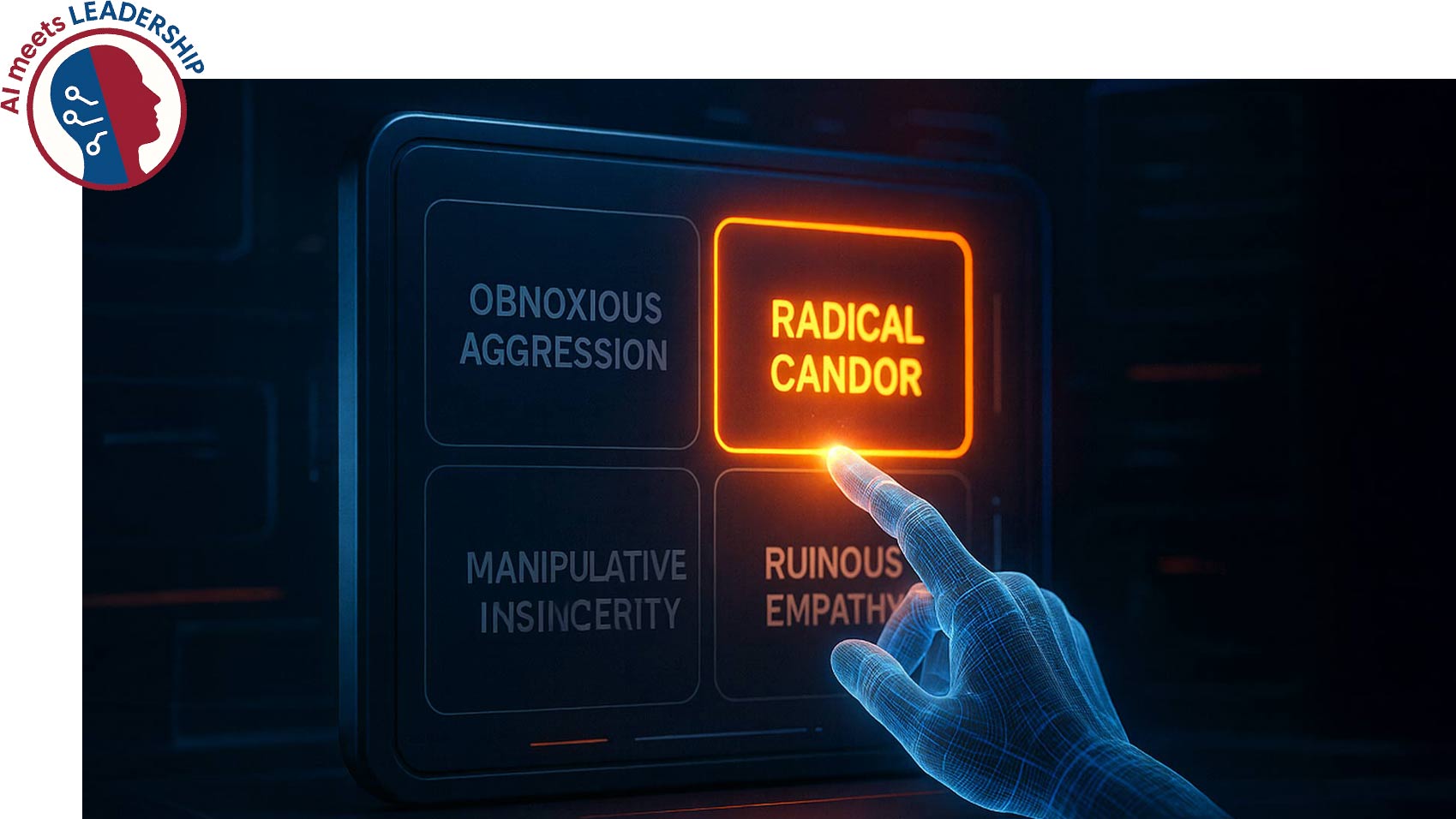Challenge Honestly, Care Genuinely: The New Relevance of Feedback
In a work environment where teams and leaders must constantly realign—driven not least by the influence of AI—an old topic becomes a current leadership resource: feedback. The age-old question remains: how do we give honest feedback that doesn’t demotivate but instead builds trust and creates safety? Kim Scott’s concept of “Radical Candor” provides a clear framework: it’s about the ability of leaders—and teams—to challenge others directly while at the same time meeting them with genuine, appreciative care. The essence lies in the combination of “Caring Personally” and “Challenging Directly,” as Scott calls it. Leaders who combine both can enable true development and foster a culture where psychological safety becomes the foundation for innovation and performance.
Is AI the Better Feedback-Giver?
This is where AI comes into play—and where permitted and encouraged, it already gives us feedback today. Perhaps even better than leaders? You’ve probably guessed it: the answer isn’t black and white. First of all, AI is a good feedback-giver. It can analyze precisely and recognize patterns we often aren’t aware of ourselves. For example, those who let AI evaluate their emails, meeting contributions, or even their communication with AI itself receive structured, clear, and often strikingly accurate feedback—including practical tips for improvement. And all in a form that follows the rules of the art: clear and constructive, embedded in appreciative wording. It really does this well—and let’s be honest—often better than leaders who still need to learn these skills and who, in everyday life, struggle under pressure, with emotions, and with shared histories. Still, AI is NOT the better feedback-giver in terms of Radical Candor. Why? Its appreciation and understanding are simulated. They are not signs of a relationship but products of prompts and training data.
You Can’t Program a Relationship
Radical Candor requires genuine relationship. It’s not just about communicating constructively or packaging criticism nicely. These are merely the required communication skills. It’s about being genuinely interested in employees, openly engaging with their perspectives and motivations, and truly wanting them to use the feedback to grow. But AI has no interest in employees—even if it sounds like it does. Have you ever received AI praise for a deliberately absurd question posed to ChatGPT? Then you know the effect. We realize AI finds it easy to say such things. It costs it nothing—and therefore it means little. That’s why we don’t build trusting relationships with it, but with the people around us—if they live Radical Candor, which is not a given and requires time and attention. Precisely this makes feedback valuable and strengthens relationships.
Even More Relationship – Self-Revelation
Feedback is also about relationship in another sense: it always reveals something about the person giving it. It communicates: What matters to them? What is their stance on collaboration? How do they want to work with their team? When feedback is generated by AI, it gives employees reassurance that they’re on the right track according to general standards—because that’s what it’s trained on. But from the feedback of leaders and colleagues, we learn what matters to others and what we are measured against. That’s what provides safety and orientation in collaboration.
Between Tool and Mindset: How AI Supports, Not Replaces, Feedback
AI feedback can do a lot, but it’s no substitute for leadership feedback. If leaders were to delegate large parts of the feedback role in employee development to AI, they would achieve the exact opposite of Radical Candor. But of course, AI can be a valuable addition and support. The future of good leadership lies in a wise both-and: technology and genuine connection. Those who use both consciously create a feedback culture that fosters safety, enables development, and strengthens collaboration.
Practical Recommendations for Your Leadership Routine
- Use AI as a preparation tool: Especially for difficult feedback situations, AI can provide recommendations and concrete guidance for leaders. This gives you confidence and maybe even the final motivational push to “go for it.” Kim Scott herself, in collaboration with Google Labs, created an AI coach that allows leaders to query their “portrait” for feedback tips. Unfortunately, it’s not yet available in Germany. ChatGPT & Co., however, are ready to support you.
- Use AI as a reflection aid: Ask AI for feedback on your communication style or general feedback behavior. Instruct it to do so with Radical Candor criteria in mind.
- Invite employees to use AI feedback to work continuously on development areas you’ve agreed on—and keep the personal dialogue going. That way you leverage the best of both worlds.
Hungry for more brainfood?
Scott, Kim (2024): Radical Candor – Authentically Leading: How to Convince as a Leader through Openness and Transparency
Scott, Kim (2024): Radical Respect: How to Work Together Better
Find the latest Radical Candor insights—for example, on leading in uncertain times—on the Radical Candor homepage: Radical Candor | Feedback Training, Coaching & Consulting
Music tip from our AI for this article 😉🤖:
You are currently viewing a placeholder content from Spotify. To access the actual content, click the button below. Please note that doing so will share data with third-party providers.

